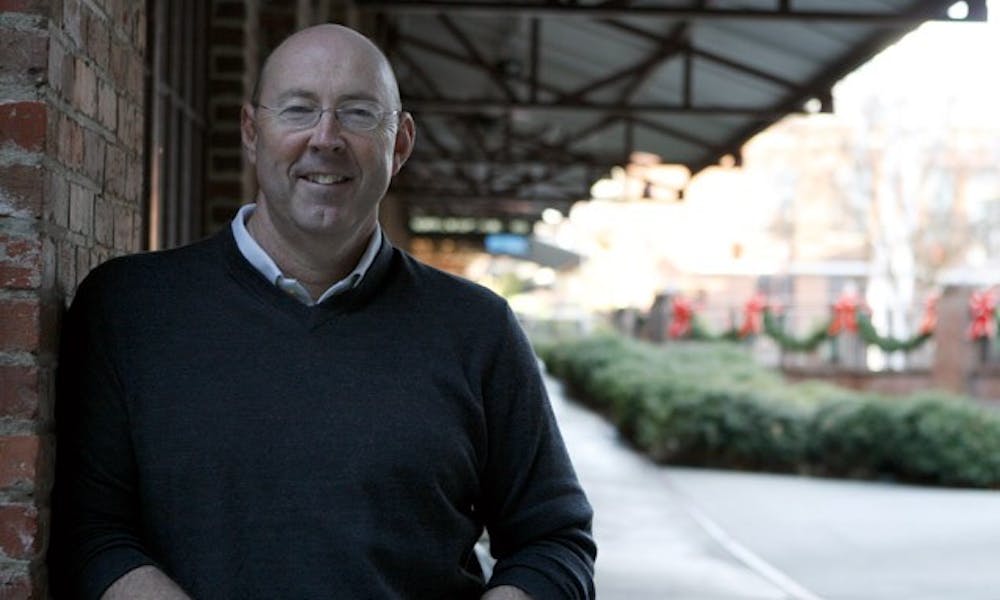It’s not your average resume for an adjunct professor at the Sanford School of Public Policy.
From his escapades as a venture capitalist to becoming the Executive Vice President of World Championship Wrestling, Kip Frey, Law ‘85, has had a wild ride, playing parts in a diverse set of business enterprises.
In the latest twist, the local entrepreneur—who was named Southeast’s top entrepreneurial CEO by Digital South Magazine in 1999—announced plans in November to leave his current post at the Durham-based venture capital firm Intersouth Partners to become chief executive officer of Zenph Studios, a cutting-edge music remastering company and an Intersouth investment based in Research Triangle Park.
“The start-up companies that I’ve run have had a combination of technology that’s really interesting and a market opportunity that at the moment seemed opportunistic,” Frey said.
Before serving in his most recent role as partner at Intersouth, he served as President and CEO at OpenSite Technologies, an online auction software firm, and earlier, was a major player in Turner Broadcasting System.
As an associate general counsel at Turner in the early 1990s, Frey found himself the subject of an unexpected request to run Ted Turner’s World Championship Wrestling organization.
“I didn’t know anything about wrestling,” Frey said. “I didn’t have any particular interest in it, but it was a chance to run a very significant division of a very large corporation.”
Frey spent a little more than a year in his position, going by the stage name “K. Allen Frey” in a Vince McMahon-like role and becoming a very public part of what he described as the “soap opera” of championship wrestling, before moving on to other ventures.
Frey’s latest undertaking with Zenph Studios tackles another arena of the entertainment industry and seeks to recreate past musical performances by converting them into data that can be manipulated on a computer. Already, Zenph has completed projects to re-master performances by renowned musicians including classical pianist Glenn Gould and pianist Sergei Rachmaninoff.
In addition to making older performances sound better, Zenph’s product allows modern-day artists to alter or build on the works of their predecessors. Features of Zenph’s technology allows users to digitally apply the “styles” of older performers to new recordings, or even insert their own performances and perform duets with other artists. Unlike older re-mastering technology, Zenph’s methodology—which can actually modify the data and sound waves associated within a performance—isn’t limited by the original recording, Frey noted.
“The re-mastered Beatles things that have just come out are really interesting and sound really interesting, but they’re simply a more perfect incarnation of what was originally recorded,” Frey said.
Frey added that Zenph has already been approached by violinist Joshua Bell, who expressed interest in performing a duet with Rachmaninoff, a 19th century Russian pianist.
“Joshua wanted to, in his performance, do something that required Rachmaninoff to change his performance a little bit. And so he asked Rachmaninoff to change his performance—and Rachmaninoff did, even though he’s been dead for [more than 60] years,” he said.
The focus of Zenph’s work has already raised questions about potential infringement of copyright laws. Frey noted that his company may find itself dealing with entirely new features of intellectual property rights.
“Because of his legal background and just the way he thinks, he has a really unique perspective and is able to look at things in different ways,” said Suzanne Cantando, communications director at Intersouth.
“If we can understand how an individual artist’s style can be applied digitally in new music, that’s a right that really doesn’t exist… so one of the interesting aspects of this company is that we’re going to be dealing eventually with truly a new species of intellectual property right, which could be fun,” Frey said.
Frey’s diverse business experiences have made their way into his classroom lectures, as well.
Senior Joshua Wohl, a former student in Frey’s course “Intellectual Property: Law, Policy, and Practice,” said Frey “was a big name-dropper” and “used to tell a lot of stories.”
In one class, Wohl added, Frey told a story about his time serving as counsel to NASCAR. Pressed for time to seek a copyright injunction against third-party merchandisers in a higher-level state or federal court, Frey got creative and maneuvered a family court judge to inflict the violation.
James Hamilton, director of the DeWitt Wallace Center for Media and Democracy, wrote in an e-mail that Frey is a “stellar teacher.”
“One great advantage of Kip’s continuing work in venture capital is that he stays current with trends in IT and media, [which] makes him a great resource as Duke students think about careers,” he said.
For Frey, staying abreast of cutting-edge trends in just another day at the job.
“It’s exciting for us to be able to bring this opportunity to the market, it’s exciting for the estates of artists whose work may have gone into the public domain [and] it’s a new stream of revenue that hasn’t existed before, so I think everyone’s going to end up winning,” Frey said.
CORRECTION: A previous version of this story incorrectly characterized musician Sergei Rachmaninoff, who is primarily known as a pianist. The Chronicle regrets the error.
Get The Chronicle straight to your inbox
Signup for our weekly newsletter. Cancel at any time.

